 © CBS, Paramount
© CBS, Paramount
I'm not going to wait till the end of the review this time to say this. I want to get it out of the way right up front. Paramount needs to get some actual science fiction writers (preferably ones who have worked on Star Trek in the past) and science and technical consultants into the writing rooms for their Star Trek shows. And furthermore, the TV writers in the room need to listen to those sci-fi writers and consultants. Not only does the second season of Star Trek: Picard fall apart due to sloppy, incoherent plotting, but it also seems painfully unaware of certain parts of Trek canon and also of how metaphor and allegory are supposed to work.
I previously wrote an outline of my ideas for re-writing the first season of Picard to retain all the good ideas, get rid of the bad, and create something that more closely resembles the type of Star Trek that I want to see. But I don't think I can do that for this season of Picard because nothing in this show makes any sense.
I was actually kind of optimistic at the start. The first 2 episodes were actually not bad, and seemed to go out of their way to try to rectify some of the complaints that were levied against season 1. This time around, the Federation is not depicted as racist cowards who are unwilling to help a refugee population fleeing from a natural catastrophe. In fact, they give long speeches about the duty of Starfleet to explore the unknown and about the value of diversity and inclusion. We still see a version of the Federation that is racist and xenophobic, but this time, it's in the form of a parallel reality fascist Confederation. The first episode is even about a starship investigating a strange anomaly in space. This is an OK start. This actually kind of sort of looks like Star Trek.
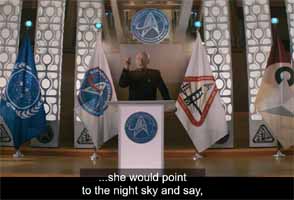 © CBS, Paramount
© CBS, Paramount
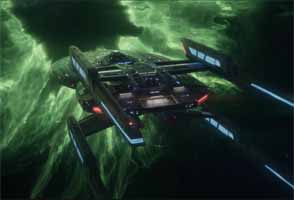 © CBS, Paramount
© CBS, Paramount
Season 2 starts off promising, with the Federation looking more like what I'm used to,
and the opening episode seemingly including an "anomaly of the week".
Problematic developments
But even from this first episode, the cracks in the storytelling are already exposed. Problem number one is that all the important character development happened off-screen between seasons. Rios apparently got over his trauma, went back to Starfleet, and was given a captaincy. He even broke up with Jurati. Good riddance. Seven and Raffi also had a relationship and then a falling-out -- all off-screen. Raffi developed some sort of proxy-parent / mentor relationship with Elnor, who also joined Starfleet, and is somehow already on a deep space assignment less than a year after enlisting. Meanwhile, Larin's husband died, and she's secretly fallen madly in love with Picard, who is now an instructor or headmaster at Starfleet Academy. Soji is an ambassador between the synths and the Federation and isn't involved in season 2 at all, despite having been the lynchpin of the first season.
The character development that happens during season 2 isn't any better. This season Fundamentally changes Picard's character. He was already unrecognizable as the same Jean-Luc Picard from The Next Generation in season 1, but I'm willing to give a pass due to the decades of time in between. People change over decades, especially if their life circumstances have also dramatically changed. Picard went from being a Starfleet captain exploring the galaxy, to sitting around his chateau with his Romulan not-slaves, sipping wine and petting dogs. Fine, I get that he's mellowed since the end of TNG.
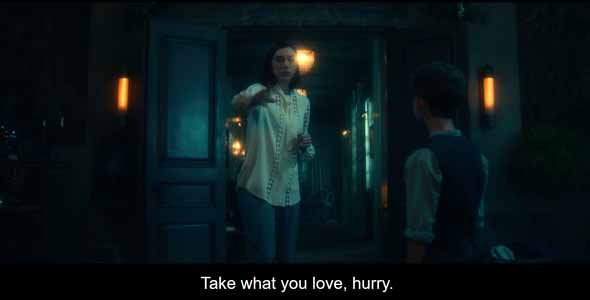 © CBS, Paramount
© CBS, Paramount
Picard's past is ret-conned to include a mentally ill mother and toxic home environment
being the reason he left home for the stars.
But season 2 actually goes back and retcons Picard's entire life in ways that reframe his entire character from TNG. He isn't the consummate explorer who joined Starfleet because of a genuine love of science and discovery. Now, he joined Starfleet to get away from a toxic home environment. It's just like how reboot James Kirk didn't join Starfleet because of a desire to explore, but because he was double-dog-dared to be a better Starfleet officer than his dead dad. But at least in Kirk's case, that is a different character in a different timeline. In Picard's case, we're supposed to believe this is the same Picard that we've known all along.
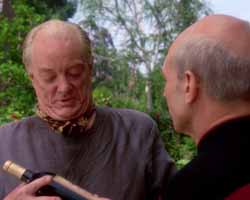 TNG s4 e2 "Family", © CBS, Paramount
TNG s4 e2 "Family", © CBS, Paramount
Where was Robert during all this family drama?
Also, did the writers not know that Picard had an older brother? Where was Robert Picard during all this drama with their parents?
And Seven of Nine has apparently regressed from any of her character development from the previous season, as she's back to mindlessly killing Borg and insisting that they "aren't human anymore". This is despite the fact that both she and Picard are case in point examples of former Borg being rehabilitated, and despite her sorrow of the destruction of the Borg Rehabilitation Project in season 1.
The lynchpin of this season is a young astronaut who suffers from crippling depression. This is despite the fact that NASA has pretty extensive screening and training processes that would either rule out someone who is not emotionally stable enough to do the job, or would train them to the point that they do the job without a second thought. This is an example of how having science and technology consultants in the writing room would help make the story more believable. [More]
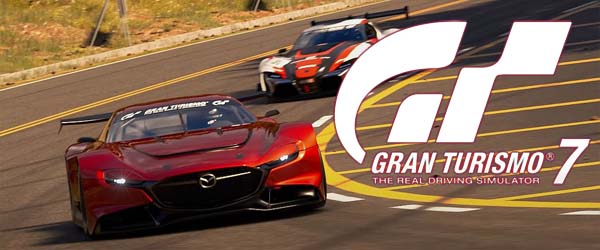
I recently published a video to YouTube explaining how playing Gran Turismo 7's weird campaign reminded me of why I stopped playing Gran Turismo games to begin with. This video is not a full review of Gran Turismo 7, since I don't do video reviews. It's more a retrospective of my history with the franchise, why I chose to buy GT7, and my reaction to the game's campaign and reward structure. Not to mention some obligatory jabs at the game's awful, scammy, and borderline fraudulent bait-and-switch monetization scheme. Even though this isn't a proper review, it does echo much of the content of my original blog review, so I invite you to check that out. And since the review already contains most of the points made in the video, I'm not going to transcribe the entire video in text.
Gran Turismo 7 reminded me why I stopped playing Gran Turismo.
In summary, I have felt that since around Gran Turismo 4, the games have shifted to being more about collecting cars than about actually driving or racing them. Reward cars are given out like candy, leading to a garage full of cars that I never drive and which I don't feel I really earned. There's no attachment or sense of ownership over the cars, and they just don't feel like my cars in the way they did in the first Gran Turismo. That first game required greater investment to win prize cars, making them feel more earned, and it put a greater emphasis on tuning the cars in the garage to get the best performance out of them. Buying my own cars and meticulously tuning them really created that sense of ownership that is just lacking in GT7.
I also want to emphasize that I do not hate Gran Turismo 7. Even though I dislike the campaign and its reward structure, and even though the monetization model is despicable, the actual driving is absolutely fantastic! Especially with the Dual Sense controller on the PS5. I am particularly impressed with how well the Dual Sense's motion controls work for steering the car. There's some nifty haptic feedback features as well, but steering the car with the motion sensor is an absolute game-changer. So the campaign may suck, but I'm still playing GT7 on a regular basis because of how much I enjoy the driving. I've been alternating between GT7 and Elden Ring.

So anyway, I hope you enjoy the linked video. Feel free to share your own experiences with the game in the comments, either here on the blog, or on the YouTube video. And remember, all my content is funded by the support of readers and viewers like you through Patreon. So if you enjoy this content, I hope you'll consider contributing to help support the creation of further content. And if you do decide to join as a Patron, then, first of all: thank you! And secondly, don't forget to fill out the Patreon Entry Survey and tell me what content you enjoy the most. [More]
399a22fb-8511-4ab1-b635-e2dadc105c07|0|.0
Tags:Gran Turismo, Gran Turismo 7, Sony, PlayStation 5, Dual Sense controller, adaptive trigger, motion control, haptic feedback, Polyphony, car, history, racing, driving, steering, collecting, Pokemon, pre-order, micro-transactions, grind, always online, YouTube
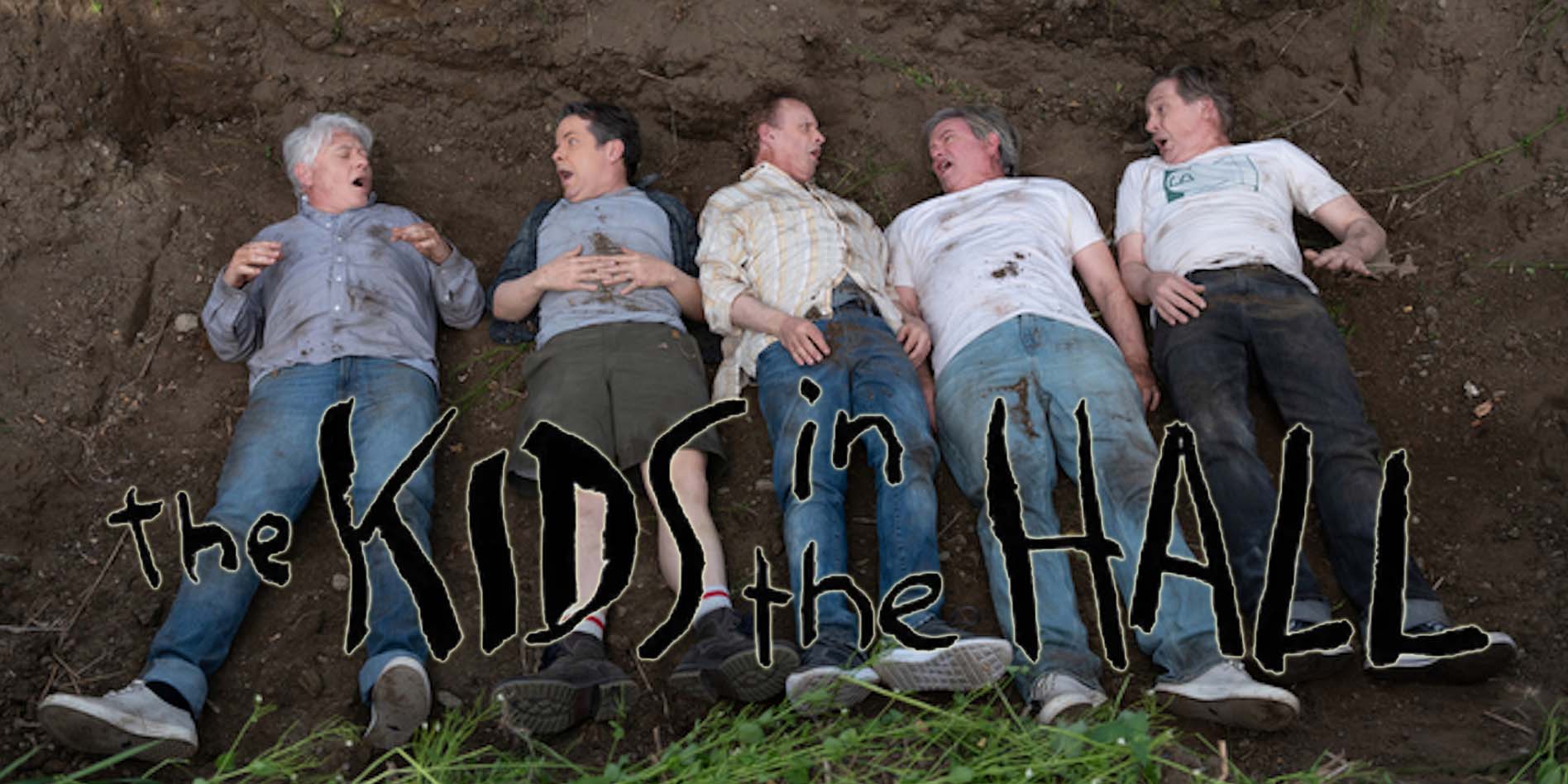
The 80's and 90's nostalgia wave has struck again. This time, it has resurrected the Canadian cult sketch comedy The Kids In The Hall. I love The Kids In The Hall, but if you had asked me if the comedy of the group of 60-year-olds would hold up after 30 years, I would have said that I would be skeptical. At least, that would have been before I saw one of their live acts when they performed in Vegas. To my surprise, it held up! So I was uncharacteristically optimistic about this particular nostalgia reboot.
The group has, after all, continued to perform together all this time. All five members have returned for the Amazon Prime reboot, which is technically being considered the sixth season of the show, which is still being produced by Lorne Michaels, in cooperation with Broadway Video, as if it had never stopped production at all.
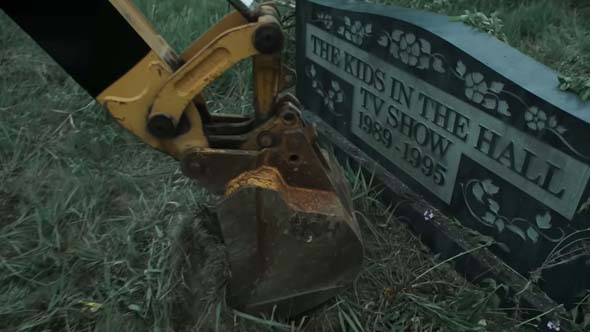 © Amazon
© Amazon
TV and movie studios are still digging up old nostalgia properties from the 80's and 90's.
But the truth is that it had stopped production. For almost 30 years. The kids aren't "kids" anymore. They're all around 60 years old. The humor has shifted to being more about growing old, the changes in culture and technology, and plenty of self-deprecation. The opening skit is a prolonged joke that, after selling a video cassette of Brain Candy (the Kids In The Hall movie from 1996) at a yard sale for a single looney, the movie had finally broken even, thus greenlighting Amazon to literally dig the show up from its grave. This imagery of the backhoe digging up the grave of a dead show from the early 90's is just so perfectly on point and sets the tone for much of the rest of the season. Other sketches from the first season include Cathy and Kathie sending the last ever fax, old businessmen adjusting to having Zoom meetings, and a sad apartment dweller fixating on how things just aren't what they used to be.
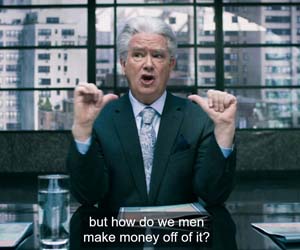 © Amazon
© Amazon
Don Roritor plainly asks
"How do we men make money off of [gender parity]?"
A lot of comedians have been walking on ice for the past few years whenever they joke about race, gender, #MeToo, cancel culture, and so forth. The Kids take on these subjects as well, but manage to do so in their trademark absurdism that somehow manages to make it feel less mean-spirited, less out-of-touch, and less like they are trying to deflect from their own personal guilt. They are sensitive to the issues, but still able to poke fun at them without punching down at any individual or marginalized group. For example, there's a bit about an office worker being fired for "cultural appropriation". And in yet another perfectly on-point bit, Mark McKinney's corporate executive Don Roritor point blank asks a panel of women how white men like him can profit from gender parity, to which the women reply matter-of-factly "you can't. That's the point."
The individual episodes are all kind of hit-or-miss with the individual sketches, as was always common with this show. The absurdism either lands, or it doesn't. But when it does, it lands so smoothly and perfectly that it more than makes up for the misses around it. I think the second episode was the peak of this reboot for me, as it's "drop average" sketch had me almost crying from laughter. This episode also features the Queen of England cutting the ribbon on a monument to Canada's last gloryhole, an adaptation of the "Imaginary girlfriend" sketch from their live show, and ends with a bit about masturbating during Zoom meetings. [More]
5ce158fe-07e4-4e23-be07-d32833791c96|0|.0
Tags:The Kids In the Hall, Dave Foley, Bruce McCulloch, Kevin McDonald, Mark McKinney, Scott Thompson, Paul Bellini, Amazon Prime, comedy, sketch comedy, reboot, nostalgia
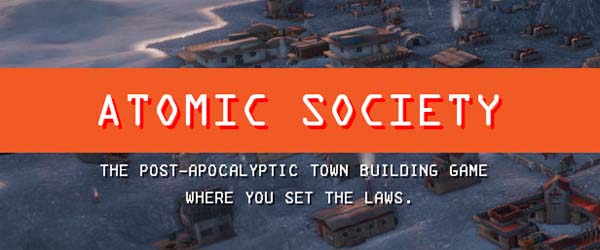
After going back and revisiting Cities Skylines for its Airports expansion and being thoroughly underwhelmed, I decided to did into my Steam backlog for some other lightweight city-builders. Far Road Games' Atomic Society had just left early access in August of 2021, so I went ahead and downloaded it to give it a try. And I was underwhelmed again.
Atomic Society just doesn't have enough content to keep me playing for very long, and the content that it does have is not nearly as engaging as I would like for it to be. It is a town-builder with a post-apocalyptic theme that seems to be heavily inspired by Fallout (possibly by Fallout 4's settlement customization mechanics). In fact, despite being a town-builder, Atomic Society requires the player to create an avatar character whose backstory is that they had emerged from a fallout shelter and is attempting to lead a band of wasteland survivors to a new home. So yeah, it's basically what you get if you imagined Fallout 4's settlement management in the form of a top-down city-builder instead of a first-person shooter. Sounds good on paper, but Atomic Society is far from the best possible take on the subject matter.
Imagine the settlement-building of Fallout 4 ... but without any of the personality.
Wandering alone
New buildings are few and far between. Because this is a post-apocalyptic game with very scarce resources and population, the total number of structures that need to be built is relatively small (though multiple copies of many basic buildings are required, and I'll be talking about that soon). As such, most of the actual game consists of micro-managing the Town Leader. This Town Leader is usually the one who has to build new structures by hand, and who has to go in and salvage materials from ruined structures and vehicles.
In fact, micro-managing this one character is so critical to keeping your town running, that the SPACEBAR (of all buttons!) is assigned the sole function of automatically selecting and centering the camera on the Town Leader. Usually, I would expect the spacebar in a town-building game to do things like pause or unpause the simulation, or to bring up the build menu or some other important management menu. Nope. In Atomic Society, the most important button on the keyboard is for selecting the Town Leader.
The Town Leader will be doing most of the scavenging, building, and repairing.
Micro-managing the Leader wouldn't be so annoying and tedious if the U.X. for managing him were a bit better. For instance, it would be nice to have a widget in the corner of the screen somewhere that shows what the Town Leader is doing at all times, and a small overview of his current inventory. There's not even a mini-map or hotkeys to quickly navigate to important locations on the map. It would also be really nice if the player could queue up actions for the Leader. Without being able to put multiple actions in a queue, I am stuck having to pause the game every few minutes to check on what he is doing and manually assign him to his next task. I'm constantly stopping the game to tell him to run to a salvage site, then back to a stockpile to drop off the materials, then out to build some building, then somewhere else to repair some building before it collapses, then back out to another salvage site.
All this babysitting gets very tedious, very quickly. Worse yet, when it does come time to actually build things, the need to manage the Town Leader can often get in the way and disrupt the flow of settlement-planning.
It doesn't help that path-finding is completely broken. I'll tell him to go to a ruin site or to deposit his inventory in the nearest storehouse, and he'll circumnavigate the entire map to get there instead of taking a direct route. Or he'll pass by right by a storehouse to get to a different one further away. And if I want him to go to a specific nearby storehouse that he refuses to path to on his own, the only alternative for me is to take manual control and walk him across the map myself using the W,A,S,D keys. It's just miserable. [More]
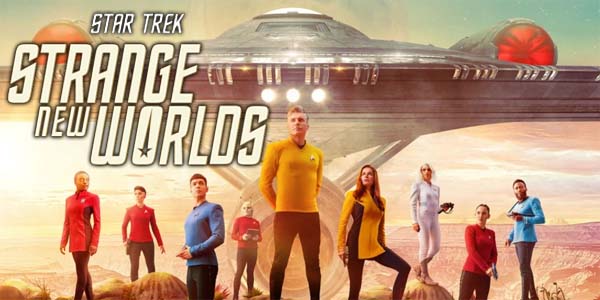
CBS and Paramount are finally learning. After years of trying to force some offensively awful Star Trek down our throats, they've finally given us something palatable. Well, I guess that's not entirely fair. I actually like Lower Decks. But Lower Decks is a self-parody animated comedy, so it's not really "serious" Star Trek, even though it's far more worthy of the franchise than the first season of Discovery or Picard.
Well, now Paramount+ also has a live-action Star Trek show worthy of the name, in the form of Strange New Worlds.
The first episode of Strange New Worlds is much more in-line with what I expect from a Star Trek show. I already talked up the virtues of an episodic format in my Lower Decks review, but focused mostly on how the self-contained nature of episodes allows some to be bad without dragging down the entire season or series with them. But the episodic nature of Lower Decks and Strange New Worlds also highlights another fundamental advantage of the episodic format: those self-contained episodes can tell more high-concept stories.
 © CBS
© CBS
Strange New Worlds is about learning from past mistakes and getting better.
The first episode of Strange New Worlds isn't the most creative or the highest of concept stories, but it's a serviceable story that is true to the spirit of classic Trek, and I'll be spoiling a lot of its plot in the coming paragraph. A first contact goes wrong, and the Enterprise has to be called into rescue the missing crew of a small scout ship. They find a pre-warp civilization that learned to reverse-engineer a warp drive from observing the events of Star Trek: Discovery. Except these people didn't use the technology to build a propulsion device; they're using it to build a weapon that they plan to use to end their own civil war. Realizing that Federation activity has already influenced the cultural development of the planet, Captain Pike decides that General Order One (the non-interference Prime Directive) does not apply. He choses to share the history of Earth's World War III (which this series assumes lies in our real-life immediate future) in an attempt to convince the warring factions to reconcile instead of risk mutual destruction.
Put simply, the first episode of Strange New Worlds differs from Discovery in that it is about preventing a war instead of starting one. It's about learning from the mistakes of past history so that they aren't repeated. And it's a stark warning of what might go wrong in today's society if political tensions don't cool off, without having to depict a future for humanity in which no social progress seems to have happened at all.
It's the type of forward-thinking story that I like about classic Trek, but which is absent from Discovery and especially from Picard (well, the first season anyway). Those shows give us a view of the future in which all the same problems that exist today still exist in 2 or 300 years. Strange New Worlds goes back to depicting a future in which humanity has learned from its past mistakes and improved itself. It's the hopeful, optimistic future that I loved from the older shows. I want to see more modern science fiction depicting futures for its audience to aspire to, instead of all the bleak, dystopian settings that dominate modern sci-fi and makes our future feel hopeless.
[More]
55d95b0e-adc5-437b-b367-2d7d9e457ad6|0|.0
Tags:Star Trek, Star Trek: Strange New Worlds, CBS, Paramount+, USS Enterprise, Christopher Pike, Spock, Nurse Chapel, Uhura, Sam Kirk, science fiction, warp drive, Starfleet, Federation, first contact, Prime Directive, Star Trek: Discovery
|

| 12 | | | | | | | 60 | | 11 | | | | | | | 55 | | 10 | | | | | | | 50 | | 09 | | | | | | | 45 | | 08 | | | | | | | 40 | | 07 | | | | | | | 35 | | 06 | | | | | | | 30 | | 05 | | | | | | | 25 | | 04 | | | | | | | 20 | | 03 | | | | | | | 15 | | 02 | | | | | | | 10 | | 01 | | | | | | | 05 |
|